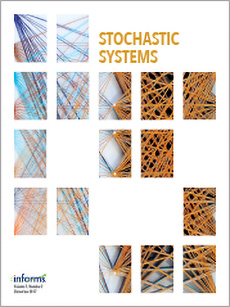Abstract
We use fluid limits to explore the (in)stability properties of wireless networks with queue-based random-access algorithms. Queue-based random-access schemes are simple and inherently distributed in nature, yet provide the capability to match the optimal throughput performance of centralized scheduling mechanisms in a wide range of scenarios. Unfortunately, the type of activation rules for which throughput optimality has been established, may result in excessive queue lengths and delays. The use of more aggressive/persistent access schemes can improve the delay performance, but does not offer any universal maximum-stability guarantees.
In order to gain qualitative insight and investigate the (in)stability properties of more aggressive/persistent activation rules, we examine fluid limits where the dynamics are scaled in space and time. In some situations, the fluid limits have smooth deterministic features and maximum stability is maintained, while in other scenarios they exhibit random oscillatory characteristics, giving rise to major technical challenges. In the latter regime, more aggressive access schemes continue to provide maximum stability in some networks, but may cause instability in others. In order to prove that, we focus on a particular network example and conduct a detailed analysis of the fluid limit process for the associated Markov chain. Specifically, we develop a novel approach based on stopping time sequences to deal with the switching probabilities governing the sample paths of the fluid limit process. Simulation experiments are conducted to illustrate and validate the analytical results.
Citation
Javad Ghaderi. Sem Borst. Phil Whiting. "Queue-based random-access algorithms: Fluid limits and stability issues." Stoch. Syst. 4 (1) 81 - 156, 2014. https://doi.org/10.1214/13-SSY104
Information





